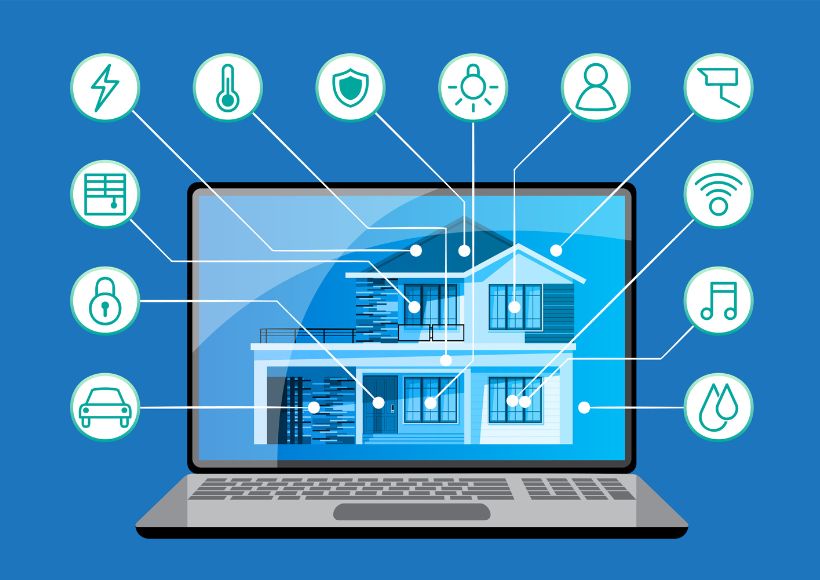Best Practices for Securing your Home Network

Choosing an internet service provider (ISP) with a comprehensive security suite can be a wise and proactive step in securing your home network and personal information from cybercriminals. In today’s digitally connected world, where our samrt homes are filled with internet-linked devices, the importance of robust online security cannot be overstated.
ISP-provided security suites typically include various protective features, such as antivirus software, firewall protection, email filtering, and sometimes even identity theft protection. These services work together to create multiple layers of defense against various online threats.
ISP with a robust security suite
Here are some key benefits of opting for an ISP with a robust security suite:
All-in-One Protection: With an ISP’s security suite, you get a one-stop solution for safeguarding your devices and data. This integrated approach simplifies security management.
Continuous Updates: These security suites are regularly updated to counter emerging threats, ensuring that your defenses are always up-to-date.
Network-Level Protection: ISP security often includes network-level filtering to block malicious websites and phishing attempts, preventing threats before they even reach your devices.
Peace of Mind: Knowing that your ISP is actively monitoring and protecting your connection can provide peace of mind, especially if you’re not tech-savvy.
Technical Support: Many ISPs offer customer support for security-related issues, assisting in case of an attack or suspicious activity.
Cost-Efficiency: Bundling security services with your internet subscription can often be more cost-effective than purchasing standalone security software.
However, it’s essential to research and compare different ISPs and their security offerings. Look for ISPs with a strong reputation for security and consider factors like the comprehensiveness of their security suite, the ease of use, and any additional costs involved.
While ISP-provided security is a valuable layer of defense, it should not be your sole security measure. Implementing other best practices, such as strong password management, network segmentation, and regular device updates, is essential to create a robust defense against cyber threats.
In today’s digital age, proactive security measures are essential to protect your home network and personal information from the ever-evolving landscape of cyber threats.
We have enrolled all these strategies in this article. So go through them and safeguard your home network. Stay safe!
Make sure to switch off your WiFi network when leaving your house.
Turning off your WiFi network when leaving your house, especially for extended periods, is a simple yet effective security measure. It prevents unauthorized access to your network in your absence, reducing the risk of cyber intrusions. Hackers can’t exploit vulnerabilities if your network is offline. While it may seem inconvenient, this precaution ensures that your home network remains entirely secure, safeguarding your sensitive information and connected devices when you’re not around to monitor potential threats.
Make a ‘home guest network’
Creating a “home guest network” is an intelligent security practice. Instead of sharing your primary WiFi password, visitors can connect to a separate network with restricted access. This guest network keeps your sensitive data, shared files, printers, and connected devices on your primary network hidden from guests. Most routers offer this feature, allowing you to set up a distinct SSID and password for visitors. It’s a simple way to maintain network security while providing guests with internet access, minimizing the risk of unauthorized access to your leading network and its resources.
Place your router in the center.
Positioning your router in the center of your home is a practical step to enhance network security and improve connectivity. This placement minimizes the likelihood of strangers in proximity detecting and potentially attempting unauthorized access. Additionally, it ensures a more even distribution of the WiFi signal throughout your house, reducing dead zones. If central placement isn’t feasible due to your home’s layout, at least move it away from windows since windows don’t provide signal shielding and may inadvertently expose your network to external threats, such as those from individuals in vehicles nearby.
Try your best to reduce the access to your home network.
Limiting access to your home network is a fundamental yet crucial security practice. Granting strangers access to your WiFi network can increase the risk of data compromise. It’s essential to discern between essential and non-essential connections. While a service technician from your internet provider may require access, most unidentified devices should be restricted unless there’s a valid reason. This simple rule helps safeguard your network and sensitive data from potential threats, emphasizing the importance of maintaining a controlled and secure home network environment.
Make use of a firewall to safeguard the gadgets on your network.
A firewall is a critical defense layer for devices on your home network. Many routers come with built-in network firewalls, but ensuring they’re enabled is essential. If your router lacks this feature, you can install a reputable home firewall solution on your devices to protect against potential router attacks. This firewall acts as a barrier, preventing unauthorized access and filtering incoming and outgoing traffic, significantly enhancing the security of your connected gadgets and shielding them from online intruders and cyber threats.
Conclusion
Securing your home network is essential in our digitally connected world. You can significantly reduce the risk of cyber threats by following best practices like enabling firewalls, centralizing router placement, limiting access to trusted devices, creating guest networks, and turning off WiFi when not needed. These proactive steps protect your data, devices, and personal information, ensuring a safer and more secure online environment within your home.
Also Read : The Eight Best Security Apps To Protect Your Mobile




